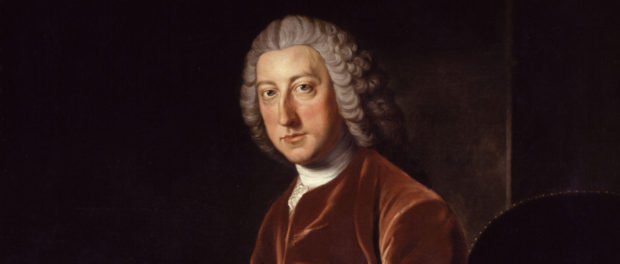1756-7: The War Goes to Europe & Other Quebec Curios
Part of “Je me souviens: New France, 1534–1763”
 Detail of a portrait (c. 1754) of William Pitt the Elder by William Hoare. Oil on canvas, in the permanent collection of the National Portrait Gallery in London (UK). Credit: Wikimedia Commons/National Portrait Gallery, London (NPG 1050).
Detail of a portrait (c. 1754) of William Pitt the Elder by William Hoare. Oil on canvas, in the permanent collection of the National Portrait Gallery in London (UK). Credit: Wikimedia Commons/National Portrait Gallery, London (NPG 1050).
While 1754 marked the beginning of a major colonial war in North America, the year 1756 marks the time when the Seven Years’ War truly became a global conflict. The British and the French formally declared war against each other in 1756, following the Battle of Minorca, a sea battle in the Mediterranean resulting in a British defeat of the garrison. However, military operations would intensify in 1757, with the ascension of William Pitt (the Elder) as the Secretary of State for the Southern Department (roughly the equivalent of the contemporary Foreign Office), the direction of the British Cabinet turned from a deferential position to that of action.
William Pitt, political man extraordinaire, allied himself with Thomas Pelham-Holles, the Duke of Newcastle. The Duke of Newcastle, heading into his second term as Prime Minister, was a Whig (as was Pitt), a right-wing political party, had leadership and finances under his belt, while Pitt was skillful at foreign affairs, which included military defense operations. Their coalition ended the political division in Parliament and established a secure and powerful ministry. Given the dismal results of Britain in Minorca and elsewhere, Pitt decided to buckle down and throw his support behind Prussia and its king, Frederick the Great, who themselves were also fighting against the French. Pitt also decided to intensify military actions near France as well as its major colony, New France. Pitt, who may have never seen the New World but for drawings and maps of it, was also concerned in reasserting British control in this area, and expand Britain’s territory by crushing the French power that claimed to dominate a good chunk of North America. Spain, dethroned as a colonial power, would also join the British as their ally in hopes of regaining its past glory.
France’s government was an absolute monarchy, ruled by King Louis XV. Determination of diplomatic policy were heavily advised by the people around him, including his former mistress, the patroness of the arts and apparently battle queen, Madame de Pompadour. Bitter against the Prussians, who had betrayed France during the War of the Spanish Succession by signing a separate peace deal with Austria instead of signing the Treaty of Aix-la-Chapelle with France, Louis XV took the maxim “the enemy of my enemy is my friend” a bit too literally and allied himself with none other than the Austrians and the rest of the Holy Roman Empire.
Though the British involvement in the war in the New World would keep on going under Pitt’s careful observance, this would change with the ascension of a new king, George III, in 1760. Though in the colonies between 1956 and 1760, more important things would be coming about, particularly with the arrival of a French lieutenant general, Louis-Joseph Montcalm.
William Pitt the Elder would eventually become Prime Minister of Great Britain in his own right. Read more about him here.





